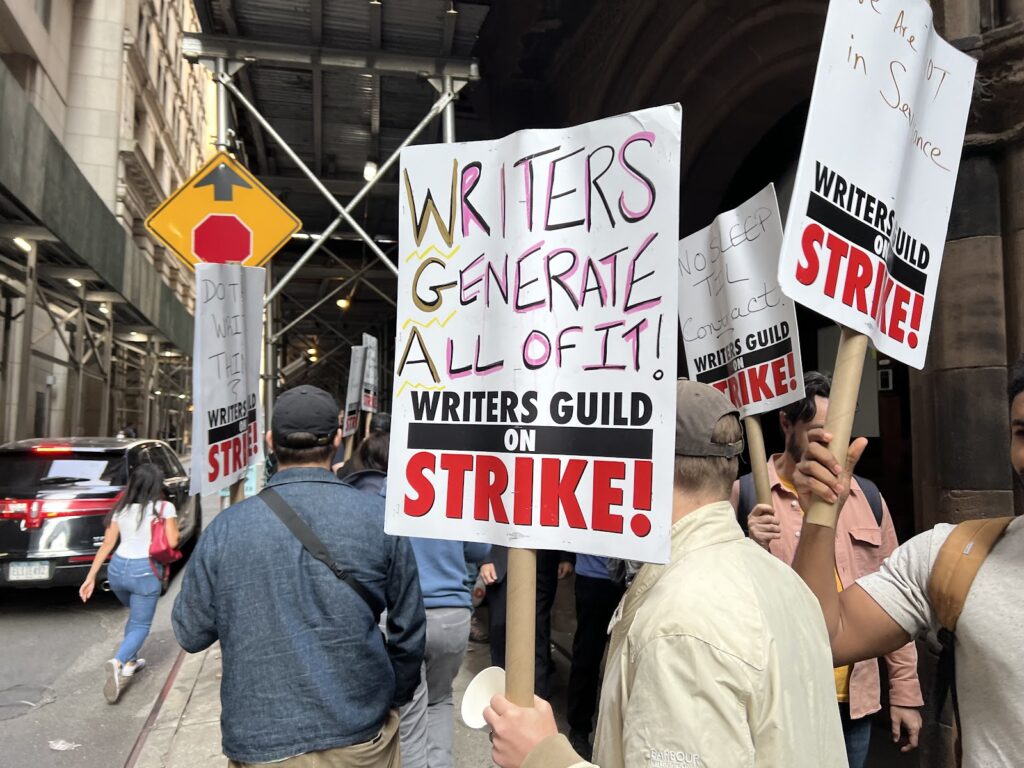
The fight for fair compensation between Hollywood’s writers and avaricious studio conglomerates has been ongoing since the ‘60s, and they have reached a long-overdue agreement that may significantly improve the livelihoods of workers.
On Sept. 27, Hollywood’s 146-day writers’ strike officially came to an end by a unanimous vote from the Writers Guild of America West Board (WGAW), Writers Guild of America East (WGAE) Council and the Negotiating Committee. The Writers Guild of America (WGA) came to a tentative agreement with the Alliance of Motion Picture and Television Producers (AMPTP) on a deal spanning the next three years.
The writers’ strike, which lasted nearly five months, served as a pivotal event within the history of the film industry, bringing writers to the front lines where they advocated for better protection against artificial intelligence (AI) and fair compensation, among other rights.
The agreement summary, which is now public, outlines the demands met. The WGA won weekly pay increases, improved terms for residual payments and screenwriter employment, increased health and pension contributions, and notably the transparency on viewership data from streaming platforms.
The WGA claims that the new agreement yields “meaningful gains and protections for writers in every segment of the membership.”
“What we have won…is due to the willingness of this membership to exercise its power, to demonstrate its solidarity, to walk side-by-side, to endure the pain and uncertainty of the past 146 days,” a statement from the WGA Negotiation committee published on the union’s website, said.
Key figures such as Disney CEO Bob Iger, Warner Bros Discovery CEO David Zaslav and Ellen Stutzman, the chief negotiator for the Writers Guild, facilitated the negotiation of the agreement.
As writers return to studios across the country, their minimum pay will increase over the next three years by 5 percent, 4 percent and 3.5 percent respectively. These increases will be implemented on the immediate Sunday after the ratification of the agreement, which will take place between Oct. 2 and Oct. 9.
As far as the use of AI, the agreement bars the use of AI in the writing or editing process of literary material that may be included in a Motion Picture. This will aid in providing a sense of security in employment for writers while also maintaining the creative integrity of scripts.
The possibility of studios replacing writers with machines stimulated reasonable unrest as the threat of unemployment concerned many individuals.
Autumn Jackson, a junior TV and film Major, and English minor, from Baltimore Maryland shares how the experiences of the strike affected her outlook.
“It changed my perspective a lot. I didn’t realize the studios viewed writers as being disposable when it’s very clear that we’re needed. It’s unfortunate that we need to go to these lengths,” Jackson said.
Both writers and producers are eager to begin resuming projects, as the 146-day strike has led to a significant economic downturn.
Todd Holmes, an entertainment media management professor at Cal State Northridge, estimated a $3 billion financial consequence on the economy of Los Angeles as a result of the strike, with ripple effects across all communities. The film and TV industry is responsible for over 700,000 jobs in California.
Writers gathered in front of Amazon Studios in Culver City, California to protest in favor of a state bill that would grant them unemployment benefits. Caterers, production assistants and businesses associated with the film industry experienced financial drop-offs.
Shom Shamapande, a full-time scriptwriting and film and TV production professor at Howard University, as well as professional writer who has sold scripts to Hollywood, shares his perspective on the lessons learned from the strike.
“It did impact my ability to create professionally this summer…Any young writer should know the rules of the writers guild, because it gives you a framework of compensation and rights. You have a right to be compensated and a right to protect your work,” Shamapande said.
Talk shows and late-night shows are wasting no time returning to the screen, as shows like HBO’s “Real Time with Bill Maher” and ABC’s “Jimmy Kimmel Live” returned on air to audiences as early as last Friday.
As far as scripted shows, there is no clear date on the horizon as to when they will resume production. The Screen Actors Guild and the American Federation of Television and Radio Artists continued their own strike, which they started in conjunction with the writers, protesting for similar benefits.
This new agreement charts a hopeful path for those aspiring to start a career in the film industry. Hope Bryant, a junior honors TV and film major, and playwriting minor from Houston shares the positive changes she is excited to see throughout the industry.
“I’m hoping that writers will get the representation they deserve. When we watch movies and TV shows, we usually see who the directors and producers are, but not the writers. It’s time for them to get equal recognition,” Bryant said.
As part of the agreement, companies are allowed to credit writers of a project as “produced by” or “presented by” in publicity releases and advertising, instead of a separate writing credit.
Copy edited by Alana Matthew

